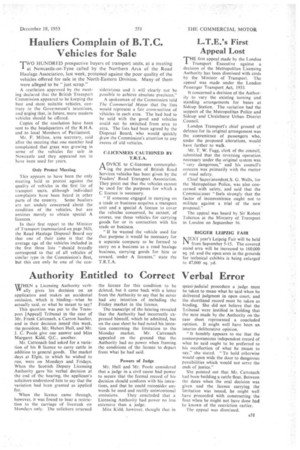Authority Entitled to Correct Verbal Error
Page 33

If you've noticed an error in this article please click here to report it so we can fix it.
/HEN a Licensing Authority verbVV ally gives his decision on an application and makes an accidental omission, which is binding—what he actually said, or what he meant to say? This question was put to the Transport [Appeal] Tribunal in the case of Mr. Frank Cattenach, a Carron haulier, and in their decision issued this week, the president, Mr. Hubert Hull, and Mr. J. C. Poole give one answer and Miss Margaret Kidd, Q.C., another.
. Mr. Cattenach had asked for a variation of his B licence to carry cattle in addition to general goods. The market .days at Elgin, to which he wished to run, were on Mondays and Fridays. When the Scottish Deputy Licensing Authority gave 'his verbal decision at the end of the hearing, the applicant's solicitors understood him to say that the variation had been granted as applied for.
When the licence came through, however, it was found to bear a restriction to the carriage of livestock on Mondays only. The solicitors returned the licence for this condition to be deleted, but it came back with a letter from the Authority to say that he never had any intention of including the Friday market in the licence.
The transcript of the hearing revealed that the Authority had incorrectly expressed himself, which he admitted, but on the case sheet he had noted his intention concerning the limitation to the Monday market. Mr. Cattenach appealed on the ground that the Authority had no power when framing the conditions of the licence to depart from what he had said.
Powers of Judge Mr. Hull and 'Mr. Poole considered that a judge in a civil cause had power to secure that the formal record of his decision should conform with his intentions, and that he could reconsider any words he used and rectify unintentional omissions. They concluded that a Licensing Authority had power no less extensive than a judge.
Miss Kidd, however, thought that in
quasi-judicial procedure a judge must be taken to mean what he said when he delivered judgment in open court, and the shorthand record must be taken as binding. She did not believe that the Tribunal were justified in holding that the nete made by the Authority on the case sheet represented a concluded opinion. It might well have been an interim deliberative opinion.
"It humbly appears to me that the contemporaneous independent record of what he said ought to be preferred to his recollection of what he meant to say," she stated. "To hold otherwise would open wide the door to dangerous possibilities which would not serve the ends of justice."
She pointed out that Mr. Cattenach had been building a cattle float. Between the dates when the oral decision was given and the licence carrying the limitation wis issued, he might well have proceeded with constructing the float when he might not have done had he known of the restriction earlier.
The appeal was dismissed.




























































































